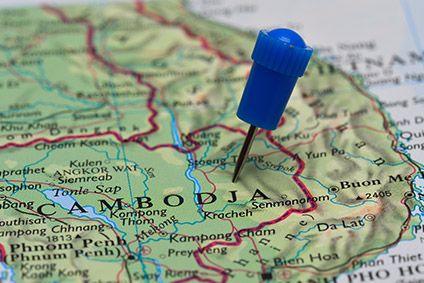
The potential loss of preferential trade access to the European Union (EU) is credit negative for Cambodia, would weaken its economic growth and undermine the price competitiveness of Cambodia’s garments exports, a global ratings agency has warned.
The European Commission (EC) earlier this month said it has begun the formal process of withdrawing Cambodia’s access to the duty-free Everything But Arms (EBA) initiative over the Southeast Asian nation’s human rights record.

Discover B2B Marketing That Performs
Combine business intelligence and editorial excellence to reach engaged professionals across 36 leading media platforms.
At the time a spokesperson told just-style the review period will take six months and Cambodia could face tariffs on garment and textile exports to the European Union (EU) within 12 months. If withdrawn from the EBA programme, Cambodia will revert to basic WTO rules.
Moody’s Investors Service adds that any change in Cambodia’s EBA status would only be implemented after negotiations with the government, which would likely take around 12-18 months.
The EU is Cambodia’s largest export market and the biggest customer for its garment and footwear production, one of the economy’s few growth drivers. Around 40% of Cambodia’s goods exports go to the EU ($4.3bn in 2017, or 20% of GDP) – and of these around 90% are sold through the EBA initiative. Garments and footwear accounted for the bulk of exports to the EU in 2017.
Should Cambodia’s trade preferences be withdrawn, the imposition of tariffs would increase the cost of Cambodian-made goods in Europe, the rating agency notes.

US Tariffs are shifting - will you react or anticipate?
Don’t let policy changes catch you off guard. Stay proactive with real-time data and expert analysis.
By GlobalDataAccording to the 2018 World Trade Organization World Tariffs report, the average EU tariff on clothing – Cambodia’s largest export to the EU – was 11.5%.
How much tariffs rise would depend on the EU’s negotiations with the government, as well as the products involved. For example, the EU could decide that some exports are exempt from tariffs, limiting the extent to which export prices rise.
Additional cost increases as a result of tariffs would undermine the price competitiveness of Cambodia’s garments exports unless they are offset by productivity gains.
“We expect the real effective exchange rate to appreciate further alongside a rising US dollar, while hikes in the minimum wage will raise production costs,” Moody’s analysts say.
The government plans to increase the minimum monthly wage for garment and footwear workers to $182 from January 2019, up from $170 in 2018.
Rising costs will reduce Cambodia’s attractiveness as a production base and could weaken foreign direct investment inflows, which have contributed to economic and financial stability.
Moreover, competition from regional garments manufacturers poses a significant threat to Cambodia’s garment exports. In particular, Bangladesh has a 6.5% share of the global apparel market compared with Cambodia’s 1.6%, highlighting its greater ability to scale production. And in a sector where scale determines profitability to a significant extent, some producers could increase their investment in Bangladesh.
Vietnam’s free trade agreement with the EU, which eliminates textile and apparel tariffs, and its inclusion in the recently signed Comprehensive and Progressive Agreement for Trans-Pacific Partnership (CPTPP), will also exacerbate Cambodia’s competitiveness challenges.
Moody’s also warns that other countries such as Australia and Canada could follow the EU in reviewing their trade agreements with Cambodia, compounding the effect on exports. Both have previously voiced concerns over its political and human rights record.
Lower exports would constrain the production of textiles, clothing and footwear, which contributed an average 1.4 percentage points on a sectoral basis to Cambodia’s 6.6% average annual real GDP growth in the five years to 2017.
Spillover effects into other sectors would exacerbate the potential negative economic effects.
In 2017, the garments and footwear sector employed around 700,000 workers, or around 7.5% of the total labour force. Any negative effect on garment employment and wages would weigh on domestic demand, which has supported overall growth in Cambodia.
Conversely, the potential withdrawal of EBA preferences could accelerate Cambodia’s efforts to diversify into other manufacturing industries such as bicycles, packaging and electronics. Over time, further diversifying its export base, particularly into higher-value-added industries, would make Cambodia’s economy stronger.





